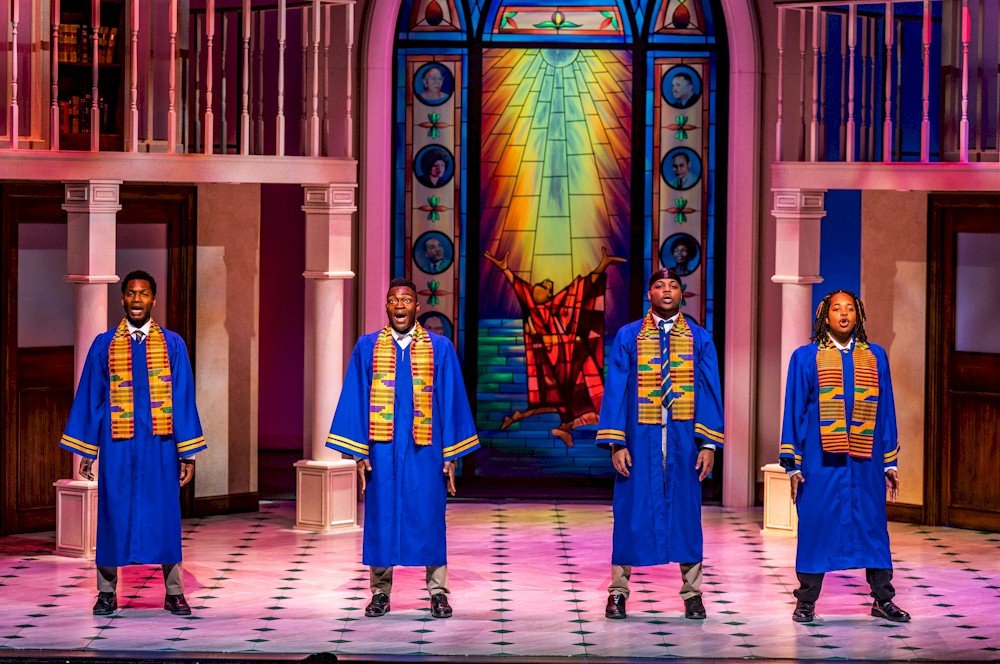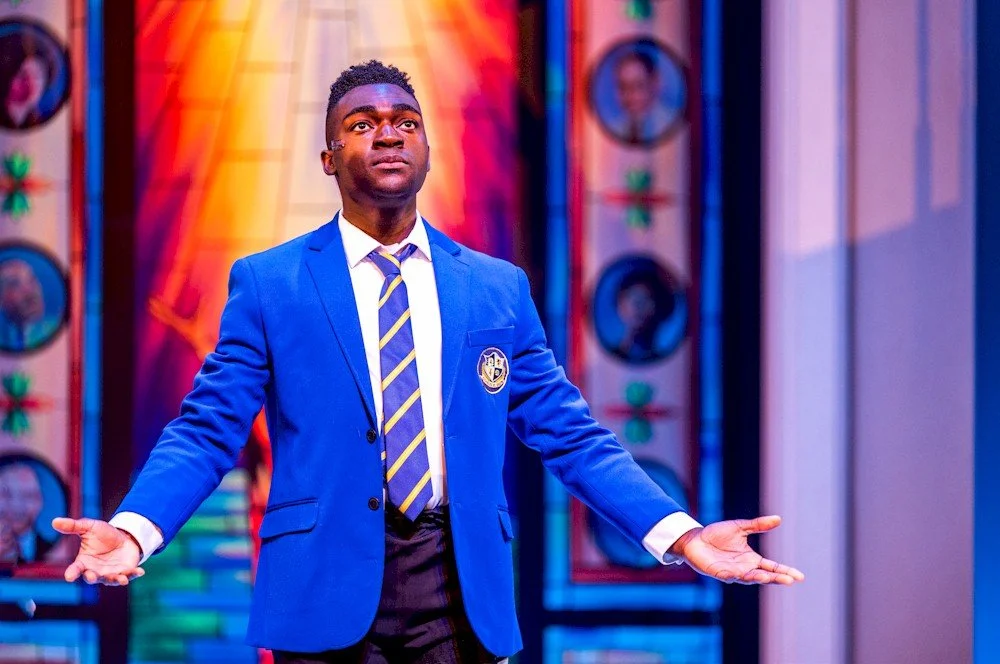In Choir Boy, prep school sets the stage for impactful a cappella reflections on sexuality and Black masculinity
Director Mike Payette and actor Kwaku Okyere reflect on nuances of play by Tarell Alvin McCraney, screenwriter of Oscar-winning film Moonlight
Choir Boy (2022). Photo by Dahlia Katz for Canadian Stage
Canadian Stage and Arts Club Theatre Company present Choir Boy on the Stanley Industrial Alliance Stage to February 25
DIRECTOR MIKE PAYETTE compares Tarell Alvin McCraney’s coming-of-age play Choir Boy to a “living document”—the cast and crew are continuously learning from each other and from the production. It’s the type of knowledge-holding that carries over into audience members, and certainly leaves the theatre with them.
Choir Boy is set in the prestigious Charles R. Drew Prep School for Boys, a Chicago institution that holds steady to a mantra of raising “strong, ethical Black men”. When Pharus Jonathan Young, a senior who leads the boarding school’s gospel choir, is harassed by fellow student Bobby Marrow for his sexuality, he begins a journey of learning to confidently accept his identity as a gay man in an environment that values conforming to tradition.
Payette directed a previous run of Choir Boy, which is coproduced by Canadian Stage and the Arts Club Theatre Company, in Toronto in 2022, and a separate production of the play at Montreal’s Centaur Theatre in 2018. What’s interesting about Choir Boy, he notes, is that each of the characters comes from a different walk of life—varying family structures, backgrounds, and representations of Black masculinity are all present within the work, and pivotal to the ways in which the boys grow up.
“I’d say there are particular tropes that we can understand within the Black community where we’re not all super accepting of each other, especially when it comes to Queerness,” Payette tells Stir. “There is a level of that taboo conversation that has historically been there. I think things are changing now, but the pendulum certainly hasn’t swung completely.
“And to support one another when we’re all fighting for that same space to belong, the question is, How do we do that?” he continues. “How do we uplift each other as opposed to bring each other down? And I think that is absolutely universal, but it’s more specific within our Black communities because of the societies we live in, you know? It’s not equal. We’re not in a post-marginalized world right now. We’re still fighting against injustice, and still having conversations of representation and inclusion, because there’s still that division.”
McCraney was propelled into stardom in 2016 as screenwriter of the coming-of-age drama film Moonlight, which was based on his semi-autobiographical play In Moonlight Black Boys Look Blue. The film directed by Barry Jenkins is set in Miami, Florida, where a young Black man navigates life from childhood through to adulthood while coming to terms with his sexuality. McCraney’s screenplay, interwoven with deeply expressive filmography, reflects on themes of masculinity and identity with vivid intimacy.
Moonlight was a seminal influence on the film scene. It became the first major Queer-storyline film to feature an all-Black cast, and went on to win three Academy Awards for Best Adapted Screenplay, Best Picture, and Best Supporting Actor. McCraney draws plenty of parallels to the film with Choir Boy, which premiered on stage in 2012 and opened on Broadway in 2019. It was subsequently nominated for four Tony Awards, including Best Play.
“He has this ability of creating such lyrical and poetic worlds in a backdrop of themes that are entirely resonant to our time, within the Black experience,” Payette says of McCraney. “To be able to dive in and be a part of that legacy of his writing is a huge gift.”
Kwaku Okyere in Choir Boy. Photo by Dahlia Katz for Canadian Stage
Kwaku Okyere, who plays the role of Bobby Marrow, views McCraney in a similar light: the Ghanaian-Canadian theatre artist tells Stir on a separate call that he’s “been enamoured by his work ever since I knew it existed”, and that Moonlight is one of his favourite films.
Okyere, who is based in Toronto, returns to Vancouver this winter after previously spending time here in the fall to codirect Jackie Sibblies Drury’s Pulitzer Prize-winning play Fairview at The Cultch. The actor first played the role of Bobby when Canadian Stage and the Arts Club Theatre Company presented Choir Boy in Toronto back in 2022.
As the nephew of Headmaster Marrow, Bobby’s air of nepotism seeps into a greater desire to put on a cool-kid persona. When the school year begins in the play, Bobby’s mother has just passed away. Much of the pain he ends up inflicting onto Pharus, who’s played by Toronto-based artist and former Canadian Idol contestant Andrew Broderick, is a direct result of an inability to process his own grief.
“As a Queer person myself, right, this character is not Queer,” Okyere says of Bobby. “And on top of that, he says some pretty strong things to Pharus that are quite homophobic. There’s a challenge that exists in terms of playing something that is so far from me, but at the same time, I think that’s what interests me as an actor. I don’t want to play myself, essentially. So I don’t know that I would call it a challenge necessarily, but maybe I’ll call it a welcome challenge.”
Similar to Moonlight, Choir Boy allows its characters to represent diverse perspectives of Black masculinity. There is no homogenous experience within identity, and the play sees Pharus break free from being pigeonholed into that state.
“Pharus is a really wonderful, shining example of the sort of multitudes that can exist within Black masculinity,” Okyere says. “It’s not just one thing. For Bobby in particular, there’s a certain type of Black masculinity that he’s attempting to employ that is a very well-trodden path. If you see the show, you’ll see that, and it’s a very recognizable version of Black masculinity. But with Pharus, there’s all of these wonderful contradictions that exist within him. He is fiercely intelligent, and really, there’s a strength to him. But at the same time, there’s a vulnerability that he’s not afraid to embrace. And I feel like for a lot of the other boys, that is a bit of a no-go zone, because that vulnerability—for them, at least—equates to weakness. And if you’re seen as weak in an all-boys school, that makes you very much a target.”
Mike Payette.
An important aspect of Choir Boy’s origins is that McCraney, an American playwright, wrote the story during Barack Obama’s presidency. The U.S. was in a transitional era marked by a strong leader, says Payette, who allowed hope and possibility to flourish in a time of division.
“The notion of brotherhood is absolutely paramount to this,” says Payette. “I can certainly resonate in terms of my experience as a Black man, you know, that we are part of a community that understands our history. We are part of a larger global community—and especially within North America, a diasporic community—that understands the level of trauma and what it means to actually find our voice in contemporary society. And you know, not every avenue—excuse the pun—is straight and narrow. It is actually quite complex, how we get there.”
Music is a vital support for navigating some of those complex pathways in Choir Boy. The production is laced with evocative a cappella hymns, which require bright precision without the backbone of instrumentals. Although Okyere is not a trained vocalist, music has always been a beloved focal point in his life, which he says “was fostered in my family quite a bit, particularly with my mom”.
Led by composer, arranger, and musical director Floydd Ricketts, the performers in Choir Boy navigate a complicated layering of harmonies. They spent ample time workshopping the music before the production’s Toronto premiere.
“The music, and the students singing together, is the anchor between all of them,” says Okyere. “There’s a really delicious, lovely commentary there that exists around being able to put differences aside to come together and do this thing that is joyful, and uplifting, and powerful, despite not necessarily seeing things from the same vantage point as someone else.”
Alongside Okyere and Broderick, Choir Boy features three other singing students—Clarence “CJ” Jura as Junior Davis, Anton May as David Heard, and Savion Roach as Anthony Justin “AJ” James—plus Stewart Adam McKensy as Headmaster Marrow, and Scott Bellis in the role of a teacher, Mr. Pendleton.
“I think we need more representations of Black men in their full spectrum of humanity,” says Okyere. “And I feel like that’s what the play aims to do, is show that the community doesn’t look just one way. There’s so many ways of being.”
Payette strives to leave audiences with similar takeaways.
“We are in a very fractured world right now,” says the director. “There’s so much call and possibility for us to become more and more separated. And we see the microcosm of that certainly within the narrative of this play. And my hope is that folks can leave the theatre and this story with a sense of rejuvenated hope in our ability to love one another, and to love ourselves for our complications, for our differences, for our uniqueness.”















